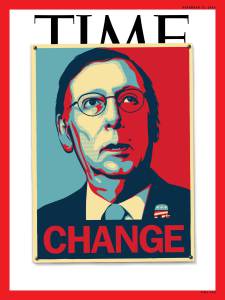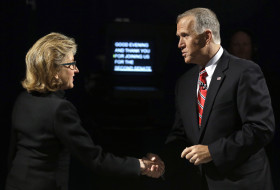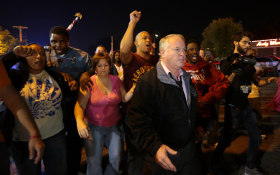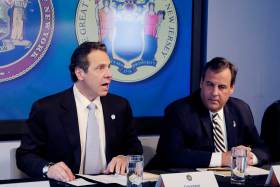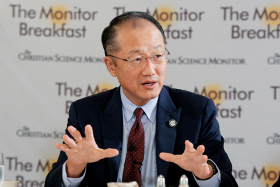
Despite mixed returns at the polls, the billionaire businessman remains bullish his climate campaign can change politics
In 2014, Tom Steyer emerged as the Democratic Party’s great green hope. The billionaire financier pledged to sink a chunk of his fortune into a campaign to make climate change a central issue in the midterm elections, and he delivered on his promise. Steyer’s political-action committee, NextGen Climate, spent some $65 million during the 2014 cycle. It ran ads in seven hand-picked states, assembled a sophisticated field organization and built a sprawling database of committed supporters.
Was it money well spent? If you measure success at the ballot box, Steyer’s return on investment may seem skimpy.
Just three of the seven candidates NextGen supported were victorious on Tuesday. Democratic Senator Jeanne Shaheen fended off a challenge from Scott Brown in New Hampshire; Democratic gubernatorial nominee Tom Wolf coasted to victory in Pennsylvania; and Democratic Senate candidate Gary Peters won an open seat in Michigan.
But Steyer’s group lost competitive Senate races in Colorado and Iowa, states into which it poured nearly $12 million, and which may prove the difference in the battle for control of the chamber. (Not all ballots have been counted in the Alaska Senate contest, and Louisiana is headed for a December runoff.) NextGen also came out on the wrong side of tight gubernatorial races in Florida and Maine, despite heavy investment to dislodge incumbent Republicans Rick Scott and Paul LePage.
But Steyer is sanguine about the election’s outcome. In an interview with TIME on Thursday, he pointed to NextGen’s ability to push climate issues toward the forefront of campaigns, as well as its efforts to begin the construction of a political machine that can become a powerful force in coming years.
“In terms of the things that we can control, we felt like wow—we way over-performed our expectations,” Steyer says, noting that the group surpassed its target of amassing a quarter-million climate-driven voters by 100,000 and beat its goal by building an email list of a million names. “Climate was a top-tier issue in every one of the states we were working on,” Steyer says, “Which is a huge change—very different from 2012, very different from 2010.”
NextGen forced Iowa Republican Senate candidate Joni Ernst to defend her climate position in Iowa, and Colorado Republican Senate candidate Cory Gardner was sufficiently cowed to run ads touting his support for wind energy in the state. But both GOP candidates prevailed. And in both states, voters declined to rank climate in the top quartet of issues, according to CNN exit polls, instead listing foreign policy, healthcare, the economy and illegal immigration as their top priorities.
In Florida, Scott made only fleeting gestures to the environmental community, and in Maine Steyer’s group failed to oust LePage, who calls climate change a hoax. NextGen’s efforts may have put Republicans on the defensive, but that’s a relatively modest achievement for tens of millions of dollars.
With the GOP poised to take control of Congress in January, the prospects for positive legislation on environmental issues have dimmed. Republicans are preparing a push to approve the Keystone XL pipeline—”a terrible idea,” especially amid plunging oil prices, Steyer says—as well as a likely effort to green-light drilling on public lands. But Steyer says that while NextGen will stay focused on educating people about the economic and environmental benefits of pursuing progressive energy policy, he’s conscious of the limits of its power to affect the legislative process.
“Do I think it’s possible for us to educate people about the facts on the Keystone XL pipeline and influence their thinking by making them aware of what the underlying issues are? Sure,” he says. “But we definitely can’t control this issue” in Congress.
The same goes for this week’s outcome at the polls. Steyer chalks up the defeats in close races to the headwinds of waging a campaign in an off-year cycle, when a second-term president with foundering approval ratings buffeted Democratic candidates. “There was a Republican wave that has nothing to do with us, and in certain of those races, it swept over us,” he says. “It’s something we can’t control.”
And so Steyer hasn’t wavered in his political or financial commitments. NextGen is “not a drive-by super PAC,” he says. “We’re going to build political assets, we’re going to build an organization, we’re choosing states that have national significance. All those things are [still] true … regardless of the outcome. So I feel really good about what we did, and I feel really good about where we’re going.”


